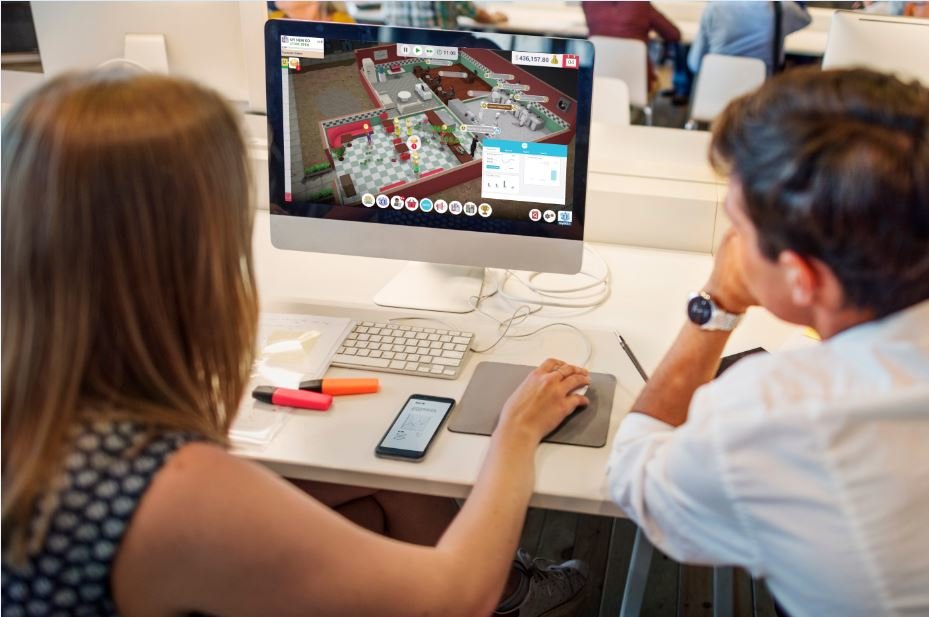Throw out that textbook, ‘gamified business simulations’ are the biz-ed tool du jour

The genesis of the project started during back in 2013 when Joy Business Academy CEO James Coddington started Pride & Joy, a project designed to teach business principles to low-skilled individuals.

“We put over 280 people through the programme and learned what the challenges young people had for gaining employment,” says Coddington. “The thing people were missing most of all were soft skills, primarily.”
“We did that for three years and it was successful, but we thought ‘there’s got to be a better way’. With gaming there’s the opportunity to make things fun, there’s that competitive element, and the addictive properties – you’ll know this if you play Fortnite. We just thought ‘we can use all these gaming benefits to create great learning outcomes’, so one thing led to another and we connected with the gaming industry.”
With that Coddington set about creating the Joy Business Academy with the specific goal of creating video games that would teach vital small business skills to young people.
“It just seemed like the closest thing we could create to starting a business without asking people to risk actual money in the process,” he says. “Essentially it’s owning and operating a business but in the virtual world. You learn the same skills without having to actually take that risk.”
But don’t think we’re talking about trivial distraction games such as Candy Crush here. Playing these games is a deep dive into the world of running a fully functioning small business (for a slightly less in-depth but very entertaining simulation, check out Bloomberg’s brilliant American Mall).
“In order to be successful you have to learn real skills,” says Coddington. “How do you treat staff? How do manage shifts? How do you pay them? How you keep customers happy? How do you bring more customers in? It’s very deep. You can literally play it for weeks.”
And the idea has found favour, not just with gaming-enthusiasts, but with organisations and companies who work closely with fledgling small businesses (Forbes predicts in-game advertising will grow to $7.2 billion by 2016 and developers are increasingly looking at in-game advertising to monetise their games).
“We found that there were organisations out there who trying to answer their own version of the problem we were trying to solve: ‘How do we connect to small businesses? So we pitched that vision to partners who we felt had the same challenge.”
Simply put, the games feature extensive in-game integration with Xero, BNZ and Ministry of Social Development (Coddington says that around 70% of the project is self-funded, with investment from BNZ and Xero and the MSD making up the remaining 30%).
“Take Xero for example,” says Coddington. “It’s a beautiful accounting package, but people don’t know how easy it is to run. So we’ve integrated Xero into the games, which makes them a realistic representation of what it’s actually like to run a business and use that software.”
This means that challenges within the game include such business standards as paying supplier invoices and staff wages, and reconciling bank feeds.
“The feedback we’ve had – from both schools and SMBs – is that playing the game has taken the mystery out of it those products, has provided them with necessary small business skills, and has helped them make huge leaps forward to operate a product like Xero.”

Minister for Social Development, Carmel Sepuloni said in a release the game educates users about the Ministry’s employment-related products in a fun and engaging way.
“Every year SMEs are constrained through a combination of external pressures, lack of business experience and commercial acumen. Recruitment, training and retention of good employees is cited as one of the most challenging aspects of businesses for in this group,” she says.
And it turns out that the ‘learning-while-playing’ format produces exceptional retention among users, says Coddington.
“From what we can tell the learning outcomes is upward of 98 percent recognition for products and services. If you do a pamphlet or brochure, it’s around seven percent. Just playing the game it becomes part and parcel of running a business. You take that offline and you’ve got some really decent tools for running your business.”
Now the goal is to keep incorporating more businesses in the games and creating new games that cover New Zealand’s core employment sectors.
“Next on the agenda is trades and services in the construction sector and then we’ll be doing one around tourism.”




